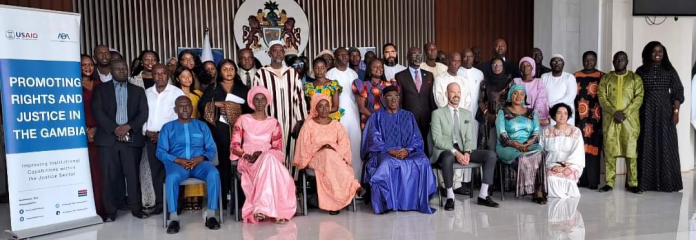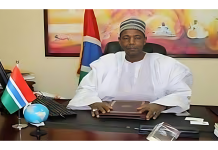By Kemeseng Sanneh (Kexx)
Chief Justice Hassan B. Jallow on Friday continued his advocacy for disputes to be resolved out of court through Alternative Dispute Resolution (ADR) processes.
An out of court settlement is a legal agreement reached between disputing parties without needing a court’s intervention.
The Judiciary of the Gambia organised an alternative dispute resolution conference on Friday, 17 May 2024. The conference was attended by distinguished judges and legal professionals from The Gambia, Rwanda, Zambia, United States and lawyers.
The aim of the event was to create a platform for dialogue and learning aimed at advancing the field of alternative dispute resolution as an alternative to court processes to address the backlog of cases in the courts and in general to improve access to justice. The theme for the event was “Enhancing Access To Justice Through Mediation”.
Chief Justice of the Gambia Hassan B. Jallow encouraged the public to consider mediation for resolving disputes outside the courtroom. He said the effective use of mediation and other forms of ADR is a timely and cost-effective settlement of cases in the courts.
“[ADR] is at the heart of the Judiciary strategic plan embodied in goal four of the plan which is described as improving efficiency of court processes and service delivery as well as in goal 7 targeting improved access to courts and tribunals. The goal was to review, revive, and strengthen the Court Connected Alternative Dispute Resolution System to reduce the burden on the court system,” he said.
He recalled after a conference in 2021, the Court Connected ADR Committee was established. Chaired by Supreme Court Judge Justice Omar M.M. Njie and assisted by High Court Judge Justice Zainab Jawara Alami of the High Court, along with other members mostly from the private practice. Their goal was to work with the Office of Chief Justice to ensure the successful adoption and implementation of ADR as part of the justice delivery mechanisms.
He said with support from the American Bar Association Rule of Law Initiative, the Judiciary established appropriate Rules of Court and trained Mediators from the Private Bar to enhance ADR benefits in the court system. He added that despite limited financial resources, the Judiciary provided well-equipped premises for Mediators to handle cases referred for mediation by Judges as required by the High Court ADR Rules 2023.
“This move was crucial as the courts faced increasing case filings while struggling to recruit qualified judicial officers [judges and magistrate’s],” he said.
The head of the Judiciary said the goal of the Judiciary Strategic Plan is to also ensure that the alternative dispute resolution system will also be reviewed, revived and strengthened to reduce the burden on the court system.
Kumba Omar Jawo, the Executive Secretary of the alternative dispute resolution unit at the Ministry of Justice emphasised the importance of using ADR to minimise the burden on the judicial system. She said alternative dispute resolution should be used to lessen the burden of cases on the courts, adding that the courts have many cases that could have been resolved through ADR means.
“As we say, only matters of serious nature should be sent to the court and those that are civil in nature should be dealt with using ADR mechanisms. The public should consider always using ADR and the courts as a last resort after all the possible means have been exhausted,” she said.
She said using ADR is less expensive and time-saving and it consolidates friendliness.
Justice Omar Njie said the Rules Committee of the High Court chaired by the honourable Chief Jusitce having the Attorney General and the President of the Bar Association as members, has ensured that the provisions of the court-connected ADR rules 2023 are now part and parcel of the civil justice administration rules.
The main feature of which is that there is a provision for an ADR conference where litigants and their legal practitioners choose ADR practitioners and also where the judges are mandated to refer a case to an ADR attempt at settlement before the case is set down for trial.
Justice Zainab Jawara Alami emphasised the importance of introducing ADR in the country. She said the Conference was convened to explore the transformative potential of ADR in resolving disputes and to celebrate the advancements made in this vital field in the judiciary of the Gambia.
She said ADR encompasses a range of processes including mediation, arbitration, negotiation, and conciliation and serves as alternative solution litigation.
Nenneh Cham, the President of the Gambia Bar Association said mediation is the way forward. She added that it is a method of alternative dispute resolution which is an effective means of settling disputes between clients and takes a shorter time as opposed to going through litigation in the courts where it could take years to conclude.
The event was a hybrid event allowing virtual participants from Rwanda, Zambia and The US.A to participate in the discussions. A virtual participant from Rwanda said lawyers are usually the first point of contact for negotiations before a case reaches the court.






















